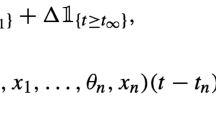Abstract
We analyze the moments of the accumulated reward over the interval (0,t) in a continuous-time Markov chain. We develop a numerical procedure to compute efficiently the normalized moments using the uniformization technique. Our algorithm involves auxiliary quantities whose convergence is analyzed, and for which we provide a probabilistic interpretation.
Similar content being viewed by others
References
Bowerman PN, Nolty RG, Scheuer EM (1990) Calculation of the Poisson cumulative distribution function. IEEE Trans Reliab 39:158–161
Ciardo G, Marie R, Sericola B, Trivedi KS (1990) Performability analysis using semi-Markov reward processes. IEEE Trans Comput C-39:1251–1264, October
Cloth L, Haverkort BR (2006) Five performability algorithms: a comparison. In: Markov anniversary meeting, Charleston, SC, USA, Boson Books, pp 39–54
de Souza e Silva E, Gail HR (1998) An algorithm to calculate transient distributions of cumulative rate and impluse based reward. Commun Stat, Stoch Models 14(3)
de Souza e Silva E, Gail HR (2000) Transient solutions for Markov chains. In: Grassmann WK (ed) Computational probability, chapter 3. Kluwer
Donatiello L, Grassi V (1991) On evaluating the cumulative performance distribution of fault-tolerant computer systems. IEEE Trans Comput 45(11)
Iyer BR, Donatiello L, Heidelberger P (1986) Analysis of performability for stochastic models of fault-tolerant systems. IEEE Trans Comput, C-35:902–907, October
Kulkarni VG, Nicola VF, Smith RM, Trivedi KS (1986) Numerical evaluation of performability and job completion time in repairable fault-tolerant systems. In: Proceedings IEEE 16-th fault-tolerant computing symposium, Vienna, Austria, pp 252–257, July
Meyer JF (1980) On evaluating the performability of degradable computing systems. IEEE Trans Comput C-29:720–731, August
Meyer JF (1982) Closed-form solutions for performability. IEEE Trans Comput C-31:648–657, July
Nabli H, Sericola B (1996) Performability analysis: a new algorithm. IEEE Trans Comput C-45:491–494, April
Rácz S, Telek M (1999) Numerical analysis of large Markovian reward models. Perform Eval 36–37
Ross SM (1983) Stochastic processes. John Wiley and Sons
Sericola B (1999) Availability analysis of repairable computer systems and stationarity detection. IEEE Trans Comput C-48:1166–1172, November
Smith RM, Trivedi KS, Ramesh AV (1988) Performability analysis: measures, an algorithm, and a case study. IEEE Trans Comput C-37:406–417, April
Stenberg F, Manca R, Silvestrov D (2007) An algorithmic approach to discrete time non-homogeneous backward semi-Markov reward processes with an application to disability insurance. Methodol Comput Appl Probab 9(4):497–519
Telek M, Horváth A, Horváth G (2004) Analysis of inhomogeneous Markov reward models. Linear Algebra Appl 386:383–405
Author information
Authors and Affiliations
Corresponding author
Rights and permissions
About this article
Cite this article
Castella, F., Dujardin, G. & Sericola, B. Moments’ Analysis in Homogeneous Markov Reward Models. Methodol Comput Appl Probab 11, 583–601 (2009). https://doi.org/10.1007/s11009-008-9075-5
Received:
Revised:
Accepted:
Published:
Issue Date:
DOI: https://doi.org/10.1007/s11009-008-9075-5



